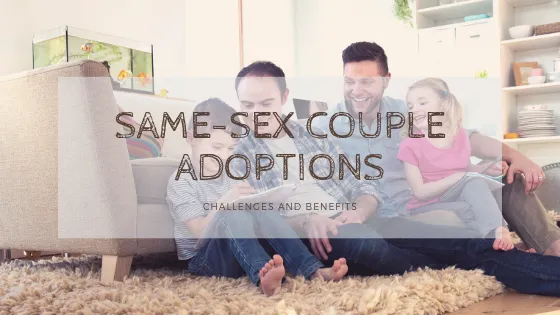
Gay rights have come leaps and bounds over the last couple of decades, but one area that lags is adoption. Adopting a child is by no means an easy process even for heterosexual couples, but same-sex couple adoption can be a nightmare. Without help, gay couples are unable to have children. Many gay couples chose a surrogate mother or father, but those that don’t choose adoption. There are more than 100,000 children that need loving, permanent homes.
The biggest argument against same-sex adoption is the children will learn behavior they may not learn in a “conventional” home. Although, there are numerous studies to the contrary. This mostly stems from morals associated with organized religions. However, a recent court decision against a Mississippi ban on same-sex couple adoption has made it legal in all 50 states. The ruling struck the ban down as unconstitutional. The precursor to this ruling was the ruling legalizing same-sex marriage.
Same-Sex Parents
An estimated six to fourteen million children in the U.S. have a gay or lesbian parent. And, between eight and ten million children are being raised in same-sex households. There have also been numerous studies conducted that prove a child raised in a gay or lesbian home isn’t at risk.
Even with all this information and the legalization of same-sex couple adoption, there are still challenges.
Adoption As an Answer for the Non-Birth Parent
We discuss significant challenges and progress that surrounds the process for same-sex couple adoption. This is also an appropriate place to mention adoption for the non-birth parent. This is outside the realm of foster or adoption agencies. It’s the process of the non-birth parent adopting the child of their partner, the birth parent.
Right now, in Rhode Island, it is highly recommended for the non-birth parent to adopt the child so they can have parental rights when it comes to the child’s well being. However, in order to do this, there is a plethora of paperwork that needs to be completed, and they’ll need to go through a monitoring process in the home which is conducted by the Department of Children, Youth, and Families.
While it’s essential for the families of same-sex couples to follow the proper procedures and guidelines set by this department when filing for adoption, many gay rights lawyers and advocates also want protections on these visitations to ensure no biases or injustices occur when assessing the fitness of the parent.
It’s essential that any government employee conducting a home study on the parenting styles of same-sex couples should not hold any prejudicial lens over their assessment. Overall, there should be more concrete adoption laws in place that protect both the parent and the child.
Same-Sex Couple Adoption
All states now allow same-sex adoption. However, there are still some laws restricting fostering children. The biggest problem facing gay couples is the stigma. To adopt a child, you will have to sit with a social worker. These social workers have their personal biases and sometimes let them influence their decisions. The stigma attached to being gay makes it much harder to adopt a child. It is hard for gay couples to receive equal treatment in adoptions.
One challenge that same-sex couples face is custody proceedings following a divorce. This can be a tricky situation, and you’ll want to consult an attorney for help. A lawyer can help. Having a lawyer that specializes in LGBT custody law helps. They can guide you through the process and help you avoid the pitfalls. Having someone that knows the law on your side can be a great asset. Rhode Island LGBT Lawyer Susan Perkins has been at the forefront of LGBT law in Providence for years. Contact her today to see what she may be able to do to help.
Facts and Statistics Concerning Same-Sex Couple Adoption
It’s crucial to study adoption statistics and facts with same-sex couples to be able to provide evidence of its success. Thankfully, many studies concerning couple adoption have already been conducted, even though same-sex couple adoption is still a relatively new concept to many people. Below is a list of promising facts and statistics that prove that same-sex couples should be welcomed into the adoption process.
- There has been zero reliable evidence that has appeared from legitimate academic family studies that prove that same-sex couples will impair the psychological function of a child. There is no empirical evidence to show that parents in the LGBT community are not fit to adopt.
- There’s no evidence to support any claims that adopted children from same-sex couples are less likely to do well in school, less popular, or have lower self-esteem.
- There is no evidence that states homosexuality is linked to any environment. The claims that same-sex couples can “make a child gay” are entirely unfounded.
- Sexual orientation has nothing to do with good parenting or the ability to create a safe and loving environment for an adopted child or children.
- Various studies have shown that adopted children are more influenced by interaction with parents than by the parents’ sexual orientation.
- Almost 40% of all private adoption agencies and 83% of public agencies report making at least one adoption placement with a lesbian or gay man. Unfortunately, one-third of agencies will reject a gay or lesbian applicant, either because of the religious beliefs guiding the agency, a state law prohibiting placement with LGBT parents, or a policy of placing children only with married couples.
Same-Sex Adoption Advantages
As you can see from the bulleted list above, some positive facts and statistics show us why same-sex couples should be encouraged to adopt. Many people are either misinformed or don’t understand why same-sex couple adoption is beneficial. There are many same-sex couple adoption advantages.
For instance, because gay and lesbian couples have to go through so much to make their place in this world equal in the eyes of the law, their more likely to work harder at parenthood. Some studies have shown that they’re more motivated, involved, and committed than their heterosexual counterparts. In addition, adopted children raised by same-sex couples are more likely to be more open to societal issues. They’re more likely to think outside the box, be more creative in problem-solving, and more empathetic to others who society deems as “different.”
Adopted children of same-sex parents are also more likely to overcome significant obstacles and stand up to adversity. They will commonly learn in a same-sex household that you need to stand up for what you believe in and never turn your back on those you love. Lastly, it’s important to note that accepting a child into a loving same-sex couple household is infinitely better for them than being raised in the foster care system.
The foster care system can do irreversible damage to children who have frequently moved around from home to home. Same-sex couple adoption allows these children to be raised with love and affection instead of within a broken system.
The Adoption Process
These are the steps in the adoption process in Rhode Island
- Attend an adoption information hearing. At these monthly meetings, presenters will explain the adoption process in more detail, and you will learn about the children who are waiting to be adopted. You can also ask any questions you may have. Applications to start the process are available at the meeting.
- Enroll in a home study and adoption preparation class. These are eight to ten-week classes that meet once a week. They will prepare you for the task of fitting a new child smoothly into your home. They will also let the home finder get to know you better and find a good match between you and a child.
- Meet with a social worker in your home. A home study by a licensed social worker is required before adoption. The idea of the meeting is to get to know you better, not see how spotless your home is.
- Complete the home study. After finishing your classes, the home finder may want to meet with you one more time to collect any homework or other paperwork from you. The social worker will then write your home study, a 12-15 page report on your family, lifestyle, and the kind of children you hope to parent.
- Wait for a match. This may take anywhere from a week to years, depending on how flexible you are about the type of child you are willing to consider.
- Learn about the child. You will be presented medical history, background information, educational records, and professional assessments. The decide if you think the child is a good fit for your home
- Meet the child and begin visits. If you choose to proceed with the match, you would then start visiting with the child.
- Lastly, finalize the adoption. After six months of living together, you will have to go to family court and legally adopt the child.
In Conclusion
Finding a child to fill your home with love shouldn’t be a scary prospect. In the past, it was much more challenging to achieve same-sex couple adoption. With the great strides our country has made toward equality, the process has become more accessible. Although you still may want some help. Seeking the counsel of an experienced adoption attorney is an excellent place to start. After all, you don’t want to go through this alone.




